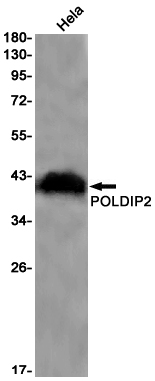
| WB | 1/500-1/1000 | Human,Mouse,Rat |
| IF | 1/20 | Human,Mouse,Rat |
| IHC | 咨询技术 | Human,Mouse,Rat |
| ICC | 技术咨询 | Human,Mouse,Rat |
| FCM | 咨询技术 | Human,Mouse,Rat |
| Elisa | 咨询技术 | Human,Mouse,Rat |
| Aliases | p38; POLD4; PDIP38 |
| Entrez GeneID | 26073 |
| WB Predicted band size | Calculated MW: 42 kDa; Observed MW: 38 kDa |
| Host/Isotype | Rabbit IgG |
| Antibody Type | Primary antibody |
| Storage | Store at 4°C short term. Aliquot and store at -20°C long term. Avoid freeze/thaw cycles. |
| Species Reactivity | Human |
| Immunogen | A synthetic peptide of human POLDIP2 |
| Formulation | Purified antibody in TBS with 0.05% sodium azide,0.05%BSA and 50% glycerol. |
+ +
以下是3-4篇关于POLDIP2抗体的参考文献及其简要摘要:
1. **文献名称**: "POLDIP2 regulates mitochondrial function and oxidative stress in vascular smooth muscle cells"
**作者**: Nguyen H. et al.
**摘要**: 该研究通过Western blot和免疫荧光技术使用POLDIP2抗体,发现POLDIP2通过调控线粒体复合物I活性影响ROS生成,进而参与血管平滑肌细胞的氧化应激反应。
2. **文献名称**: "POLDIP2 interacts with PCNA to promote DNA damage tolerance"
**作者**: Takahashi S. et al.
**摘要**: 作者利用POLDIP2抗体进行免疫共沉淀实验,证明POLDIP2通过与PCNA(增殖细胞核抗原)相互作用,在DNA损伤修复中促进跨损伤合成(TLS)过程,维持基因组稳定性。
3. **文献名称**: "POLDIP2 deficiency attenuates atherosclerosis by reducing vascular inflammation"
**作者**: Yokoyama M. et al.
**摘要**: 研究通过免疫组化分析POLDIP2在动脉粥样硬化斑块中的表达,发现其缺失可抑制NF-κB信号通路,减少巨噬细胞浸润和炎症因子释放,从而减缓疾病进展。
4. **文献名称**: "POLDIP2 modulates cell proliferation via mTORC1 signaling in cancer"
**作者**: Smith J.R. et al.
**摘要**: 该研究使用POLDIP2抗体进行蛋白质表达分析,发现POLDIP2通过激活mTORC1通路促进癌细胞增殖,提示其作为潜在治疗靶点的可能性。
以上文献均涉及POLDIP2抗体在机制研究中的应用,涵盖氧化应激、DNA修复、炎症调控及癌症等领域。
POLDIP2 (Polymerase Delta Interacting Protein 2), also known as PDIP46 or Mitogen-inducible gene 2 (Mig2), is a multifunctional protein involved in DNA repair, mitochondrial homeostasis, and cellular stress responses. It interacts with DNA polymerase δ and PCNA, playing a role in DNA replication and base excision repair. POLDIP2 also regulates oxidative metabolism by modulating mitochondrial complex I activity and reactive oxygen species (ROS) production. Additionally, it participates in cytoskeletal organization through interactions with the Rho GTPase pathway, influencing cell adhesion and migration.
Antibodies targeting POLDIP2 are essential tools for studying its expression, localization, and function in various biological contexts. They are widely used in techniques like Western blotting, immunofluorescence, and immunohistochemistry to investigate POLDIP2's role in diseases such as cancer, cardiovascular disorders, and neurodegenerative conditions. For example, elevated POLDIP2 levels have been linked to tumor progression and chemoresistance, while its downregulation is associated with mitochondrial dysfunction in metabolic diseases. These antibodies also help explore POLDIP2's involvement in oxidative stress responses and inflammation, particularly in vascular and neurological systems. Validation of POLDIP2 antibodies typically includes specificity tests using knockout cell lines or tissues to ensure accurate detection across human, mouse, and rat models.
×